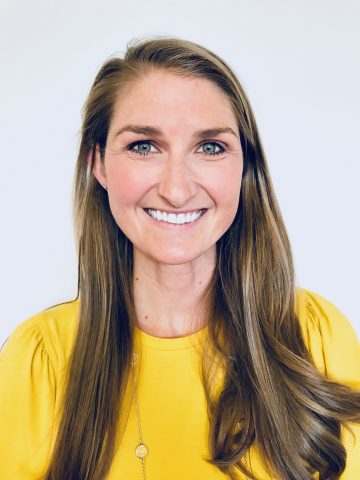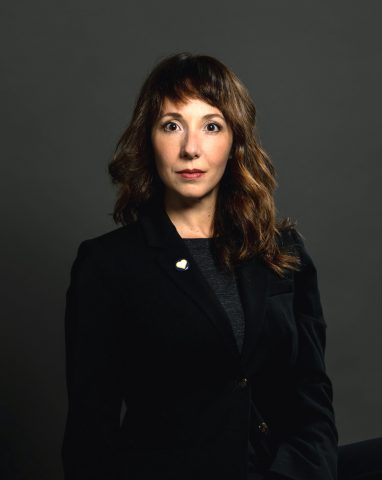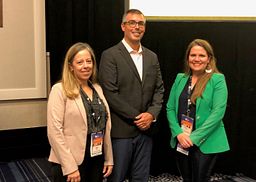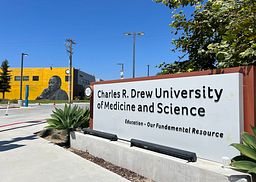2020–2021 PAEA Research Fellows Focus on PA Student Mental Health and Well-Being
The PAEA Research Fellowship offers promising PA researchers the opportunity to contribute to the growing body of PA scholarship, broaden their knowledge of PA education and the profession, and expand their professional networks.
PAEA is pleased to announce the selection of Stephanie Neary, MPA, MMS, PA-C, of Yale Physician Assistant Online Program and Adrian Banning, DHSc, MMS, PA-C, of Drexel University as the members of the 2020–2021 cohort of PAEA Research Fellows. Neary and Banning were selected for this honor after undergoing a rigorous, blinded review and interview process. Both faculty researchers have identified a dearth of research in PA mental health and well-being and seek to improve training to allow students to effectively manage their mental health and provide high-quality treatment to patients in their professional careers.

Neary plans to study the effects of a dedicated well-being curriculum on PA student mental health. She was motivated by her own experiences as a student in two master’s programs, paired with her experience advising numerous didactic students who felt like they were the only ones struggling with their mental health and personal lives, preventing them from reaching out for help, both formally and within their own peer groups.
Neary’s fellowship research will build on work she started three years ago, when — through research studies and focus group sessions — she and a team of other researchers uncovered a few key themes that seemed to be standing in way of students fully acknowledging their mental health status. Among these themes were the questions of how medical providers can help others if they themselves need help, whether students might be perceived as “less than” for recognizing their own vulnerabilities, and the perception that the white coat comes with the need to be seen as infallible. Neary hopes that her curriculum will provide all students with foundational skills in positive coping and self-reflection and grant them permission to acknowledge their own emotions. By creating a culture that promotes individual well-being and encourages open discussion surrounding personal challenges, she hopes to also improve the mental health help-seeking behavior of students.
From a policy perspective, Neary hopes to build on the body of evidence that can support change at the state and national levels. If this evidence-based intervention is successful, the intent is to make this available to programs and students nationwide. Neary is encouraged by ARC-PA Accreditation Standard B2.20 and hopes that her research can help to further refine future program requirements. Personally, Neary hopes that the Fellowship will provide her with knowledge and skills necessary to become a leader in PA research. With a growing workforce each year, she believes that PA faculty have a responsibility to continue improving their understanding of the needs of the profession in terms of clinical acumen and personal well-being.
“As an educator, my specific interest is in working to continuously improve the educational experiences of our future colleagues,” said Neary “The resources provided through this fellowship will allow me to continue working toward these goals and will serve as a major step towards a lifetime of work in the field.” She also noted that she has always enjoyed mentoring students in the early phases of research, fostering their personal interests and planting the idea early-on that they can be both a clinician and a researcher.

Banning will investigate associations between PA program curricula and student-reported well-being, in addition to associations between student demographics (e.g., gender and racial identity), program characteristics (e.g., urban vs. rural), and student well-being. She points to the lack of evidence on PA program well-being curriculum efficacy and plans to investigate whether different approaches to teaching provider wellness impact student outcomes. Banning hopes that her study will prove valuable to PA programs seeking to meet ARC-PA Standard B2.20, which is focused on provider wellness. The study may also identify whether subgroups of students (e.g., women, racial, or ethnic minorities) report different levels of stress and well-being, which is especially important to support equity, student recruitment, and retention, as well as anti-discrimination and anti-racism efforts. Ultimately, Banning would like to see formalized policies that protect well-being and mitigate burnout in PA programs and clinical settings. She said that knowing more about how to teach well-being, how much time to contribute to it, and who might benefit most is just a starting point — especially because PAs experience burnout slightly differently than nurses and doctors do.
Banning was drawn to academia and research prior to becoming a PA. Then as PA faculty, her interest increased out of a love of teaching evidence-based medicine. Her previous research has explored the effect of art therapy on medical education and its relationship to communication, ambiguity, empathy, and well-being. She believes it is important to use the best possible evidence when making important decisions. This passion translates to the classroom where evidence-based teaching and learning can help inform compliance with accreditation standards.
She compares research to a flashlight in a dark tunnel: “We all have to get through the tunnel, but if we have a bright flashlight, the path is a little easier. There is less tripping, less fear. As a PA researcher, I want to help generate evidence that lights our paths forward.” Banning encourages fellow researchers to dive into research and forego the fear of failure. “I have no shame in sharing that I applied in a previous cycle and was not accepted. I don’t think we share our ‘failures’ enough,” she said. “I gained so much confidence by just trying, and I got amazing feedback and support on how to improve. So, do it and try again if it doesn’t work out.” Banning also advises novice researchers to be curious and thorough in developing a realistic methodology with as little bias as possible. And of course, find a knowledgeable mentor who is encouraging and actively engaged.
Neary seconds the importance of finding a mentor who understands your passion but can also challenge you and be critical and honest of your work. She believes that a good mentor should understand your weaknesses and can work with you to grow in these areas. She also encourages researchers to “find something that you really care about that you never get tired of thinking about, because there are a lot of late nights and setbacks along the way. This passion is what gives projects that special edge and sets them apart.”
PAEA welcomes Banning and Neary to the growing Fellowship cohort and broader PA research network. and is excited to see what their research produces.
If you are interested in hearing about the research our Fellows have done, learning about how you can be a part of the next cohort, and networking with experienced researchers, join us on Tuesday, October 20, at 3:20 p.m. ET at the 2020 PAEA Education Forum. We will delve into the latest research from our outgoing 2019–2020 AAPA-PAEA Research Fellows and introduce our incoming 2020-2021 fellows along with their new research projects.
We also have grant programs that are currently accepting applications, including the Don Pedersen Research Grants Program, which is a great opportunity for faculty just getting their feet wet in research. The program focuses on faculty development in research on PA education and PA workforce issues. Grants of up to $7,000 may be awarded, with a total possible allotment of $21,000. Applications must be submitted by Sunday, November 1.




